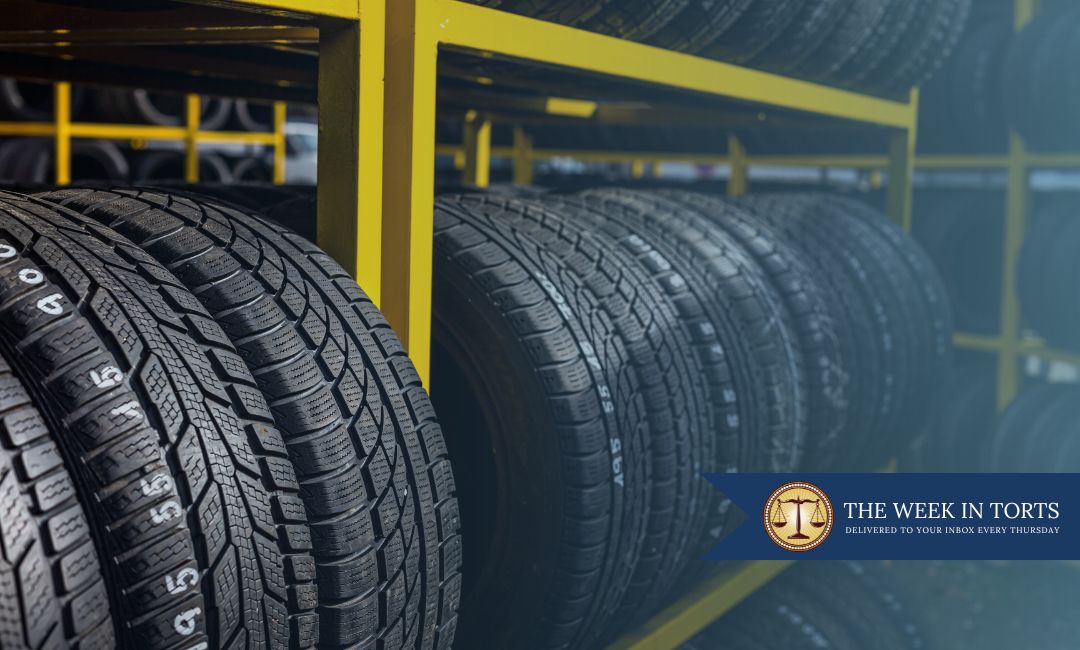The Week In Torts – Cases from November 10, 2023

It’s the industry’s standards that matter
FLORIDA LAW WEEKLY
VOLUME 48, NUMBER 45
CASES FROM THE WEEK OF NOVEMBER 10, 2023
TRIAL COURT ERRED IN GRANTING PLAINTIFF’S MOTION FOR NEW TRIAL BASED ON FINDING THAT DEFENDANT’S BREACH OF ITS OWN INTERNAL POLICY WAS EVIDENCE OF THE STANDARD OF CARE AND A BREACH – – VIOLATION OF AN INTERNAL POLICY IS NOT EVIDENCE THAT A DEFENDANT VIOLATED AN INDUSTRY STANDARD OF CARE
Discount Tire v. Bradford, 48 Fla. L. Weekly D2127 (Fla. 5th DCA Nov. 3, 2023):
This wrongful death case arose out of a single vehicle crash that resulted from the failure of a fourteen-year-old tire. The plaintiff sued Discount Tire after both her husband and son were killed.
The plaintiff claimed that Discount Tire had breached certain industry standards, but failed to offer evidence to support her claim. The trial court then granted Discount Tire’s motion for directed verdict and entered judgment in its favor. Subsequently, the trial court reversed itself, granting the plaintiff’s motion for a new trial based on the argument that the defendant’s breach of its own internal policies was sufficient to create a legal duty.
Florida law is clear that a defendant’s internal policies alone do not create or define a duty owed to the plaintiff, resulting in a reversal of the order granting a new trial, and remand for entry of final judgment in favor of the defendant.
An important takeaway from this case is about expert testimony. One of the plaintiff’s experts testified that the defendant was negligent for servicing the fourteen-year-old tire and rotating it from the front to the rear, because “industry standards” call for taking the tire of that age out of service. The plaintiff’s expert also testified that the tire failed because it was too old.
Another one of plaintiff’s experts testified that different tire manufacturers and vehicle manufacturers use varying definitions for what is “old,” and while there was evidence that there are standards observed in two industries (tire manufacturing and vehicle manufacturing) no expert actually identified any industry standards that were violated.
There was also evidence in the case that the defendant’s internal policy was actually more stringent than most other single shop businesses (choosing not to service any tire that was over ten years old), and testimony that the defendant had violated its own extraordinary “internal policy”, but still not identifying any existing industry standards regarding older tires that the defendant had violated.
The court concluded that the fact that the defendant’s internal policy called for it to refuse service to a customer if the customer did not want to purchase a new tire, could not be evidence that the defendant violated the industry standard of care, and there was no other evidence to support that. As such, judgment for the defendant was appropriate.
PARTIES MAY NOT RECOVER COSTS FOR COMPUTER RESEARCH, POSTAGE, MEALS, MILEAGE OR PARKING
Flopro, LLC v. EOX Technology Solutions, Inc., 48 Fla. L. Weekly D2112 (Fla. Nov. 1, 2023):
Following a jury verdict, the prevailing party moved for costs. It sought small amounts for Westlaw research, postage, meals, mileage and parking. Following an evidentiary hearing, the trial court awarded an amount for costs that covered those charges.
The court reminded us that under the uniform guidelines for taxation of costs, none of these things are awardable (they are office expenses).
In this day of complex litigation, when many such costs are necessarily incurred over long and involved trials, perhaps one day the supreme court will revisit the statewide uniform guidelines.
COURT STRIKES DOWN PROPOSAL FOR SETTLEMENT FOR FAILING TO SATISFY STANDARDS OF SECTION 768.79 AND RULE 1.442
Knapp v. Harling, 48 Fla. L. Weekly D2123 (Fla. 1st DCA Nov. 1, 2023):
The plaintiff leased an apartment for seven years. She then stopped making the monthly payments while still occupying the property.
The landlord filed a complaint for eviction and for non-payment of rent and prevailed.
A couple of months later, the tenant sued for constructive eviction, negligence and a violation of section 83.55 for failing to comply with the terms of the rental agreement. The landlord served a proposal for settlement offering to pay the tenant fifteen-hundred dollars if she dismissed her claims against the landlord. She refused. The tenant lost, and the jury awarded the landlord ten-thousand dollars on his negligence counterclaim.
The court held the proposal was unenforceable for failing to state that it would resolve “all damages.” Instead, it was limited to resolving only the tenant’s direct claim and the prospective damages against the landlord. The court found that the landlord’s proposed settlement did not address his counterclaims or the damages awardable in the final judgment, and thus would not have ended the litigation.
Because the landlord’s offer did not state that it would resolve all damages awardable in the final judgment, and because it only addressed damages sought by and awardable to the tenant, it failed to qualify as an “unqualified” settlement proposal.

